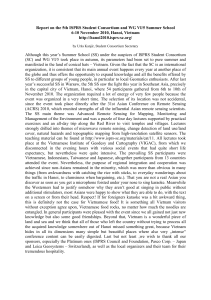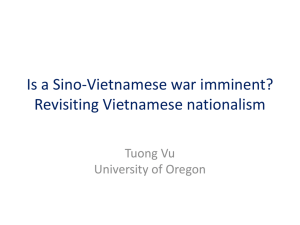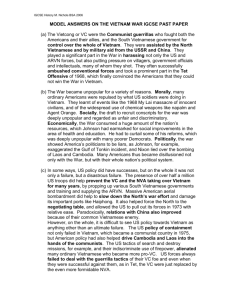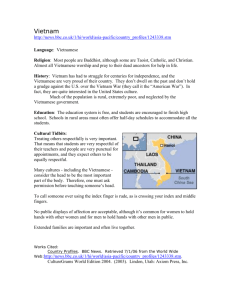Environmental Philosophies of College Students in Vietnam and the U.S.
advertisement
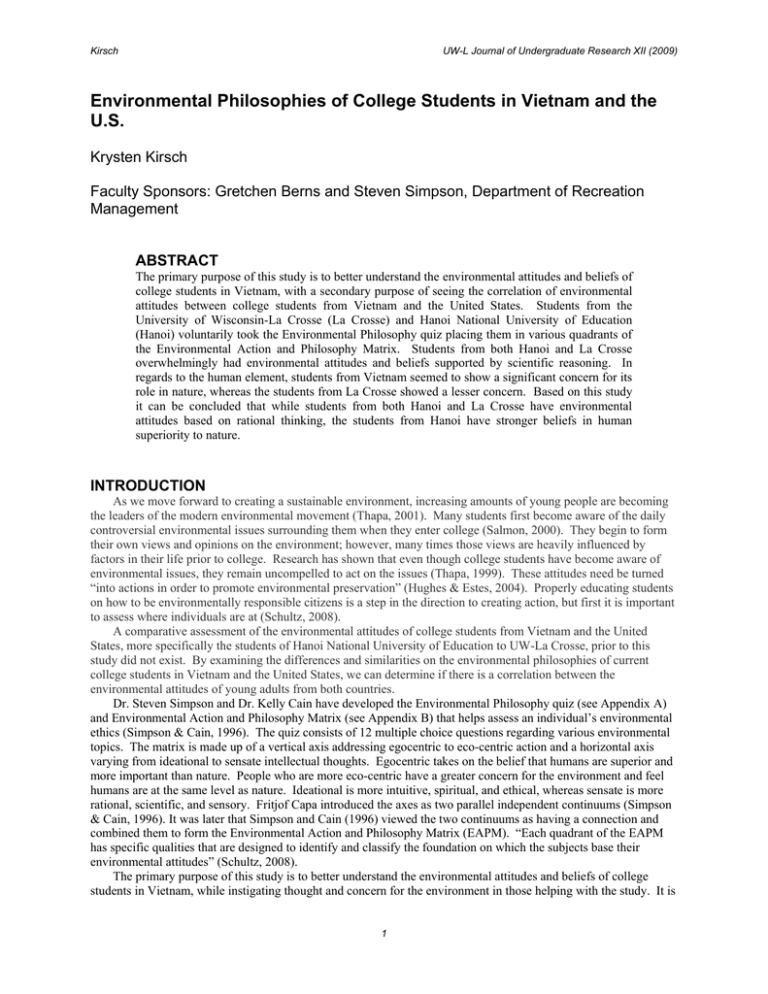
Kirsch UW-L Journal of Undergraduate Research XII (2009) Environmental Philosophies of College Students in Vietnam and the U.S. Krysten Kirsch Faculty Sponsors: Gretchen Berns and Steven Simpson, Department of Recreation Management ABSTRACT The primary purpose of this study is to better understand the environmental attitudes and beliefs of college students in Vietnam, with a secondary purpose of seeing the correlation of environmental attitudes between college students from Vietnam and the United States. Students from the University of Wisconsin-La Crosse (La Crosse) and Hanoi National University of Education (Hanoi) voluntarily took the Environmental Philosophy quiz placing them in various quadrants of the Environmental Action and Philosophy Matrix. Students from both Hanoi and La Crosse overwhelmingly had environmental attitudes and beliefs supported by scientific reasoning. In regards to the human element, students from Vietnam seemed to show a significant concern for its role in nature, whereas the students from La Crosse showed a lesser concern. Based on this study it can be concluded that while students from both Hanoi and La Crosse have environmental attitudes based on rational thinking, the students from Hanoi have stronger beliefs in human superiority to nature. INTRODUCTION As we move forward to creating a sustainable environment, increasing amounts of young people are becoming the leaders of the modern environmental movement (Thapa, 2001). Many students first become aware of the daily controversial environmental issues surrounding them when they enter college (Salmon, 2000). They begin to form their own views and opinions on the environment; however, many times those views are heavily influenced by factors in their life prior to college. Research has shown that even though college students have become aware of environmental issues, they remain uncompelled to act on the issues (Thapa, 1999). These attitudes need be turned “into actions in order to promote environmental preservation” (Hughes & Estes, 2004). Properly educating students on how to be environmentally responsible citizens is a step in the direction to creating action, but first it is important to assess where individuals are at (Schultz, 2008). A comparative assessment of the environmental attitudes of college students from Vietnam and the United States, more specifically the students of Hanoi National University of Education to UW-La Crosse, prior to this study did not exist. By examining the differences and similarities on the environmental philosophies of current college students in Vietnam and the United States, we can determine if there is a correlation between the environmental attitudes of young adults from both countries. Dr. Steven Simpson and Dr. Kelly Cain have developed the Environmental Philosophy quiz (see Appendix A) and Environmental Action and Philosophy Matrix (see Appendix B) that helps assess an individual’s environmental ethics (Simpson & Cain, 1996). The quiz consists of 12 multiple choice questions regarding various environmental topics. The matrix is made up of a vertical axis addressing egocentric to eco-centric action and a horizontal axis varying from ideational to sensate intellectual thoughts. Egocentric takes on the belief that humans are superior and more important than nature. People who are more eco-centric have a greater concern for the environment and feel humans are at the same level as nature. Ideational is more intuitive, spiritual, and ethical, whereas sensate is more rational, scientific, and sensory. Fritjof Capa introduced the axes as two parallel independent continuums (Simpson & Cain, 1996). It was later that Simpson and Cain (1996) viewed the two continuums as having a connection and combined them to form the Environmental Action and Philosophy Matrix (EAPM). “Each quadrant of the EAPM has specific qualities that are designed to identify and classify the foundation on which the subjects base their environmental attitudes” (Schultz, 2008). The primary purpose of this study is to better understand the environmental attitudes and beliefs of college students in Vietnam, while instigating thought and concern for the environment in those helping with the study. It is 1 Kirsch UW-L Journal of Undergraduate Research XII (2009) hypothesized that students from Vietnam would have beliefs coinciding with scientific views. This hypothesis can be based on the results of the research Schultz found from the U.S. students in a prior study. This study also seeks to learn of any correlations between college students from Vietnam and the United States and to accumulate research that will be beneficial to future comparisons and ultimately assist the field of environmental education. METHODS Data was collected from 46 Vietnamese students studying English at Hanoi National University of Education and compared to data collected by Jeremy Schultz from 145 UW-L students. The students voluntarily took the Environmental Philosophy Quiz designed by Dr. Steven Simpson and Dr. Kelly Cain after signing an informed consent form written in Vietnamese. The questionnaire involved 12 multiple-choice questions about a range of nature-related subjects that help to determine an individual’s environmental perspectives depicted on the Environmental Action and Philosophy Matrix (EAPM). The quiz was translated into Vietnamese and doublechecked for accuracy and consistency by two separate international students from Vietnam to minimize misinterpretation amongst participants. The quiz was administered to the selected class that researchers received permission to work with. The students received both verbal and written directions on how to complete the quiz. The directions were simplistic enough that a translation into Vietnamese was not needed. Each quiz question required a first and second choice answer that was recorded onto a scoring sheet. All the participants were responsible for scoring their own quiz, however after errors were noticed later on, each scoring sheet was double checked for accuracy before entering the data into a spreadsheet to be available for analysis. The data was refined to exclude any cases where the quiz answers were incomplete and then the remaining scores were analyzed using SPSS to determine the average responses to each quadrant of the EAPM. Along with each of the individual quadrants of the EAPM, an analysis of the Egocentric/Ecocentric and Ideational/Sensate continuums were also evaluated. Since the sample sizes were larger than 30, normality was assumed and an independent t-test and a significance of .05 (α = 5%) was utilized to compare the desired means. RESULTS Although it appears the mean scores between the United States (U.S.) and Vietnamese students are very close for each of the quadrants (see Figure 1), only quadrant 4 (p=.854) had statistical non-significance signifying a possibility of no difference between the two groups likelihood of being in quadrant 4. This means there are significant differences in means for quadrants 1 (p=.013), 2 (p=.0005), and 3 (p=.046). The U.S. students scored the most often in quadrant 4, with quadrant 2 following close behind; whereas the Vietnamese students scored the most often in quadrant 2, with quadrant 4 following close behind. Figure 1. Resulting means for each quadrant of the EAPM 2 Kirsch UW-L Journal of Undergraduate Research XII (2009) It is evident that both students from the U.S. and Vietnam scored higher on the Sensate side of the Ideational/Sensate continuum (see Figure 2). When looking just at the Ideational half, the U.S. students have a higher score, whereas when looking at the Sensate half, the Vietnamese students have the higher score. An equal statistical significance (p=.001) for the Ideational and Sensate halves exists, showing differences between the groups. Figure 2. Resulting means for action continuum of the EAPM When comparing the means on the Egocentric/Ecocentric continuum (see Figure 3), the Vietnamese students scored slightly higher than the U.S. students on the Egocentric half, but lower than the U.S. students on the Ecocentric half. Statistical non-significance was evident for the Egocentric and Ecocentric quadrants (p=.169). Figure 3. Resulting means for intellectual continuum of the EAPM DISCUSSION Based on the research performed by Schulz and readings concerning environmental education with an emphasis on conservation, the hypothesis was that Vietnamese students would also fall heavily in the sensate quadrants, particularly quadrant 2, defined as ego-centric, sensate (Schultz, 2008, & Vu, 2008). The results provide support for this hypothesis. Over two-thirds of the students from Vietnam had views based on rational thinking, with the slight majority having traditional conservationist views. 3 Kirsch UW-L Journal of Undergraduate Research XII (2009) Although the majority of Vietnamese students scored in quadrant 2, it is surprising that number is not higher. Vietnam developed a strategic plan for 2001-2010 that emphasized incorporating more environmental education into the schools and universities to coincide with the United Nations Decade of Education for Sustainable Development (DESD). Since the environmental education being utilized is focused on the “importance of the environment towards human life” and conservation, and it is now towards the end of the decade; we would assume more students would have conservationist views (Cuc, 2004). Hanoi University of Education has carried out different projects and workshops to train teachers to become environmental educators as well (Cuc, 2004). The Vietnamese students used in this study were all enrolled in the Faculty of English College at Hanoi University. In regards to both the United States students and the Vietnamese students having high scientific reasoning as a basis for their environmental views, they should be taught in a format parallel to their way of thinking. It seems that teaching in a scientific and logical way can be used to reach both students from both the U.S. and Vietnam on different environmental issues (Schultz, 2008). Another point of interest is the results of the ego-centric/eco-centric continuum. On this scale, the majority of the Vietnamese students scored on the eco-centric half. One would want to assume that since the overall majority scored in quadrant 2, that when broken into the continuums, the Vietnamese students would still remain high in sensate and egocentric views. However after a closer evaluation, one will notice that quadrant 3 (defined as ideational, eco-centric) coincides with Buddhist views (Simpson & Cain, 1996). Buddhism is the number one religion in Vietnam (CIA, 2009). This study cannot prove a belief in Buddhism is the reasoning for the pull to an eco-centric view, but further research could determine its possibility of being a contributor. LIMITATIONS The sample size available for the data collected from the Vietnamese students was insignificant compared to the sample size of the U.S. students. In addition, the students from Hanoi National University were all students studying English, whereas students from UW-L were from numerous disciplines. With a larger more varied sample from Vietnam, it is possible the results could differ. Additionally, it seems that religion could play a factor in a person’s environmental philosophy. Religion was not a variable collected when this study was performed and may be a variable to add to future studies to determine if there is an actual correlation between environmental philosophies and religion. ACKNOWLEDGEMENTS I would like to sincerely thank Dr. Gretchen Berns and Dr. Steven Simpson for believing in my ability to complete this research study. I would also like to thank Kaye Schendel for coordinating classroom time with students from Hanoi National University, Van Ngo and Anh Nguyen for helping with translations, and Dr. Barbara Bennie and Statistics Counseling Center for helping with statistical analysis. In addition, thanks go to Jeremy Schultz, Justin Watson, Robert Rydeski, and Bryan Beall for all their contributions and support in this project as well. And lastly, this project would not have been possible without funding from the UW-L Undergraduate Research & Creativity Grant. REFERENCES CIA. (2009). Vietnam. Retrieved March 28, 2009, from CIA-World Factbook website: https://www.cia.gov/library/publications/the-world-factbook/geos/vm.html Cuc, L. T. H. (2004). Vietnam and education for sustainable development: Reality and prospects [Data file]. Retrieved March 28, 2009, from UNESCO Web site: http://www.unescoapceiu.org/bbs/files/doc/2004/041123_Sub_Regional_Le_Thi_Hoang_Cuc.doc Education for Nature, Vietnam. (2005). Retrieved March 28, 2009, from http://www.envietnam.org/ Hughes, C., & Estes, C. (2005). The influence of environmental education on environmentally responsible behaviors of undergraduate students in a traditional and nontraditional setting. Journal of Experiential Education, 27(3), 308-310. Salmon, J. (2000). Are we building environmental literacy? Journal of Environmental Education, 31(4), 4-10. Schultz, J. (2008) Environmental attitudes: a comparative study of recreation and environmental studies students. Master's thesis, University of Wisconsin-La Crosse. Simpson, S., & Cain, K. (1996). A Leopold for the nineties: The ecological age and outdoor recreation. Journal of Experiential Education, 19(1), 14-21. Thapa, B. (1999). Environmentalism: The relation of environmental attitudes and environmentally responsible behaviors among undergraduate students. Bulletin of Science, Technology & Society, 19(5), 426-438. 4 Kirsch UW-L Journal of Undergraduate Research XII (2009) Thapa, B. (2001). Environmental concern: A comparative analysis between students in Recreation and Park Management and other departments. Environmental Education Research, 7(1), 39-53. Vu, Q. (2008). Education for Nature Vietnam (ENV). Retrieved March 28, 2009 from http://www.gea.or.jp/41activ9/ngovietnam-en.pdf APPENDIX A Environmental Philosophy Quiz Written by Steven Simpson and Kelly Cain, ©1997 (revised 2006) 1. The most important role of national parks is to: a) serve as a place for people to have a spiritual experience with the natural world b) serve as a place for quality outdoor recreation and tourist opportunities c) serve as a place for the animals and plants to live free and undisturbed d) serve as a place for environmental stability and maximum natural biodiversity 2. The most important role for environmental education is to teach: a) an understanding of ecological communities, including the perspective that humans are part of those communities b) an understanding of nature's magic, myth, and spiritual vitality c) techniques of wise resource use and protection, so that the resources are available for human use and recreation d) an appreciation of nature's role in advancing human spiritual and ethical growth 3. My personal relationship with nature can best be summarized: a) as a pioneer or adventurer. I go to nature to feel freedom, independence, and to relive the adventure of the explorers. b) as a conservationist. Nature is for human benefit and enjoyment, but I care that nature and natural resources will be available for future generations c) as an intuitive oneness with the natural world d) as a community of humans and the non-human. Science shows that 1) maximum biodiversity makes for a healthy ecosystem and 2) humans are not exempt from the rules of these ecosystems. 4. I would purchase fewer material goods and lead a simpler lifestyle if I was sure that it would: a) protect the ecology of wetlands, rainforests, and other natural communities b) protect the rights of the earth's plants and animals c) contribute to a more careful and more sustainable human use of natural resources d) contribute to a more wholesome, moral, and spiritually rich society 5. Endangered species should be protected because: a) it is humanity’s role, even its destiny, to be the protector of all things on earth b) all living things have value to human beings. The loss of a species means it is not available for humans to use and enjoy. c) all species have an inherent right to exist d) each species contributes to the biodiversity and ecological balance of the planet 6. The primary reason for preserving wilderness and wild areas is that: a) these places provide ecological stability b) these places are the rightful homes for plants and animals c) these places supply quality recreation and are a depository of natural resources for future generations d) these places represent humankind's adventurous spirit and are a source of spiritual rejuvenation 7. I would willingly pay more money for a pair of shoes if the additional cost: a) enhanced the culture, the spirit, the quality of life of people in the country where the shoes were produced b) meant using recycled materials freed natural resources for other useful products c) meant no animals were harmed or killed in the production of the shoes d) meant no ecosystems were damaged as a result of making the shoes 8. I would be most likely to donate money to an organization dedicated to: a) the study and the protection of wetland ecosystems b) the rehabilitation of injured owls and eagles, and their release to the wild c) scientific research that would help to maintain a local natural resource-related industry (e.g., logging, fishing, small-scale farming) d) the connection between nature and the world's great religions 5 Kirsch UW-L Journal of Undergraduate Research XII (2009) For questions 9, 10, 11, and 12, there are two questions for each number. Answer only the question that best matches your interests and/or philosophy. 9a. "Small family farming,” especially with small dairy herds, are a dying industry in the US. The dairy industry is moving toward large industrial scale operations with hundreds to thousands of cows at each facility. The demise of small dairy farms is a tragedy because: a) it is the slow death of traditional culture in many rural communities b) small dairy operations provide a stronger foundation for the local economy, based on the wise use of natural resources, than do industrial scale farms c) small dairy farmers are more likely to be sensitive to the needs of individual species that share their land d) small dairy operations have less negative impact on the overall quality of local ecosystems 9b. Commercial fishing is a dying industry all over the world. The once rich oceans have been over fished, and fish populations have been slow to recover. The demise of the fisheries is a tragedy because: a) it is the slow death of a traditional culture in many fishing villages b) it is the destruction of a humanly useful and economically significant renewable resource c) it is further evidence of human injustice inflicted upon fellow species d) it is a serious imbalance of a large marine ecosystem 10a. I include pork, beef, and lamb in my diet because: a) the human role in the ecosystem is as an omnivore b) although I feel part of the natural world, killing animals for food is philosophically consistent with that view c) it is a concentrated source of protein/ it is a food source that helps feed the population of earth d) my religious doctrine and/or cultural heritage eats meat 10b. I do not eat meat (pork, beef, or lamb) because: a) the raising of domestic animals leads to unnecessary destruction of natural ecosystems b) animals are spiritual entities and should not be used as food c) of health reasons. Also the belief that eating lower on the food chain provides more food for the rest of the world d) my religious, spiritual, or cultural roots tell me it is wrong 11a. I oppose hunting as a recreational pursuit, because: a) the advancement of humans as a enlightened species moves us away from such uncivilized actions b) the management of wildlife for human benefit and enjoyment is best served by banning hunting c) I feel that humans are part of nature, and therefore, we should not kill our animal brothers and sisters for food or sport d) a science-based policy that has humans as stewards for the community of earth is inconsistent with hunting 11b. I support hunting as a recreation pursuit, because: a) the challenge of hunting can lead to moral growth; it is reliving the history of humankind b) the management of wildlife for human benefit and enjoyment is best served by hunting c) hunting makes us spiritually equal to the prey; we are truly one with nature d) hunting is a logical extension of humans as part of the community of nature 12a. I favor the use of nuclear energy because: a) science has shown that nuclear energy's impact on ecosystems is less destructive than fossil fuels b) intuitively I feel that the life force of the planet is not compromised by the use of nuclear energy c) science and technology have shown it to be safe to humans, and it provides a more concentrated source of energy than other fuels d) uranium was put on earth for human use; it contributes to fulfillment of the human potential 12b. I oppose nuclear energy, because: a) science has shown that nuclear energy has the potential to disrupt or destroy entire ecosystems b) intuitively I feel that nuclear energy is a threat to the life force of the planet c) science and technology has shown nuclear energy to be potentially dangerous to humans d) intuitively I feel that nuclear energy is a threat to human life APPENDIX B 6 Kirsch UW-L Journal of Undergraduate Research XII (2009) 7
![vietnam[1].](http://s2.studylib.net/store/data/005329784_1-42b2e9fc4f7c73463c31fd4de82c4fa3-300x300.png)

